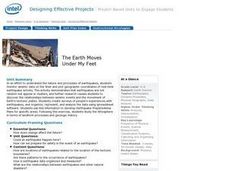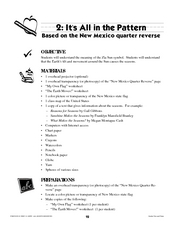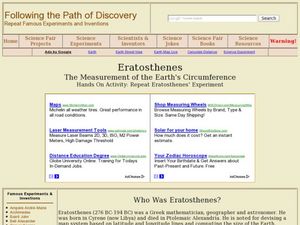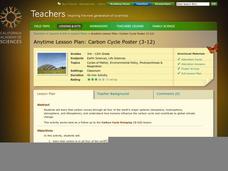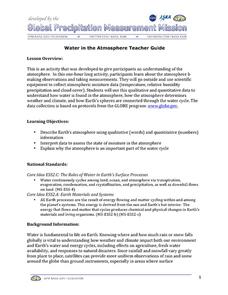Science 4 Inquiry
Journey Through the Spheres of the Earth
Each of the Earth's spheres interacts with the other spheres in predictable ways. Young scientists explore these interactions through a hands-on activity, graphing, and watching a video. They summarize their knowledge in a video or...
It's About Time
Impact Events and the Earth System
What would happen to Earth if an asteroid struck it? Assist young scientists as they explore the mechanics of an impact event and effects caused by it; calculate the energy released once an asteroid strikes Earth's surface; and...
Curated OER
Earth's Rotation
Fourth graders investigate the Earth's rotation. In this Earth's rotation lesson, 4th graders realize that the rotation of Earth causes the days and nights on Earth. Students break into groups and use a flashlight and a sphere to...
NOAA
Wooly Magma
Model the earth's core with a neat activity that uses science as an inquiry and step-by-step procedures. The activity acquires a lot of assistance from the teacher or volunteer helpers.
NOAA
Plate Tectonics II
Mid-ocean ridges, rift valleys, island arcs, mountain ranges, earthquakes, volcanoes ... there are so many features associated with plate tectonics. The 14th installment of a 23-part NOAA Enrichment in Marine sciences and Oceanography...
Curated OER
The Earth Moves Under My Feet
Students study earthquakes, monitor seismic activity using the Web, and plot real-time activity. They examine movement of the Earth's tectonic plates. They create an earthquake preparedness project.
Curated OER
Edible Four-Layer Earth
This lesson is designed to come after students have studied about the four main layers of the earth. They may relate the size of the sections to known objects such as the mantle to the size of a grapefruit and the outer core to the size...
Curated OER
It's All in the Pattern
Here is a fantastic, nine-page, multi-session lesson plan on the Zia Sun Symbol (found on the New Mexico state flag), and the seasons of the Earth. Everything you need to implement the lesson is here, and the many engaging activities are...
NASA
Einstein's Gravity
Assist your high school class with researching and applying the principles of gravity so they may further understand why Einstein is so widely recognized, even today. Individuals compare and contrast two different models that demonstrate...
Curated OER
Windbreakers; Earth Science, Topography, Weather
Students consider how topography affects weather and human activity. Students simulate a mountain range and observe surrounding wind patterns.
NOAA
The Biogeochemical Cycle
The biogeochemical cycle ... no physics? The fourth installment of a 23-part NOAA Enrichment in Marine sciences and Oceanography (NEMO) program introduces the biogeochemical cycle by having pupils simulate movement between Earth's...
Curated OER
Connect the Spheres: Earth Systems Interactions
Is everything really connected? Take your class on a walk outside, where they will make observations and write them down on a worksheet. Once they are back in the classroom, learners will work to determine if and how things like birds,...
Curated OER
Hello, Sunshine!
Students investigate how the sun travels across the sky at different latitudes using Solar Motion Demonstrator. In this earth science lesson, students explain why seasons change. They study how the tilt of the Earth's axis affects...
Curated OER
Eratosthenes
Students examine what Eratosthenes is and the history behind him. In this earth instructional activity students complete a hands on activity to repeat Eratosthenes' experiment.
Curated OER
Resources for Teaching about Biogeochemical Cycles
Students study the different cycles and Earth's systems. In this investigative lesson students study the nitrogen and carbon cycles, play a game pertaining to it and also participate in a class activity.
Curated OER
Map Projections: The Grapefruit Activity
Students partcipate in activities in which they examine different map projections. They discover the positives and negatives of each type. They use grapefruits to help them with the different types of map projections.
Curated OER
Lunar Lollipops
Demonstrate the lunar cycle to youngsters using flashlights and lollipops. The procedure is somewhat vague, so it will need to be modeled for them before turning them loose to try it. The questions that follow the activity are not...
California Academy of Science
Carbon Cycle Poster
Humans can have a big impact on the environment, specifically the influence they have on the carbon cycle. First, the class will define and discuss each of the earths four major spheres, the biosphere, hydrosphere, atmosphere, and...
Curated OER
An Introduction to the Night Sky and Movement Astronomy
Basically, this is an interactive exploration of educational astronomy software and an app. Young astronomers discover how the apparent motion of the sky relates to Earth's movements and the position of the observer. It is out of this...
California Academy of Science
Carbon Cycle Role Play
Anytime you make concepts clear with role playing or hands-on experience, it's a win for the whole class. Ping-Pong balls are used to represent carbon in a carbon cycle role-play activity. In small groups, children first discuss what...
Curated OER
Water in the Atmosphere
A slide show serves as the backdrop for a lesson on the moisture in Earth's atmosphere. Through it, mini meteorologists learn about the attributes of the atmosphere and actually use data-collecting weather tools to make observations and...
Curated OER
World Geography: Climate Change Round Table
Students are able to explain the suspected causes of relatively recent climate changes, specifically the observed global warming. They discuss how unusual or extreme global warming disrupts the balance of the earth's geo-spheres.
National Endowment for the Humanities
Galileo: Revealing the Universe
To gain an understanding of the significance of Galileo Galilei's revolutionary ideas, class members watch the short video "Stargazing Before Galileo," and conduct a close reading of Galileo's Sidereal Messsenger. They then...
Curated OER
Demonstrating the Distances of Stars
Learners examine the distance from Earth to stars. They create a model to show the arrangement of constellations. They also identify the importance of the parallax effect.







